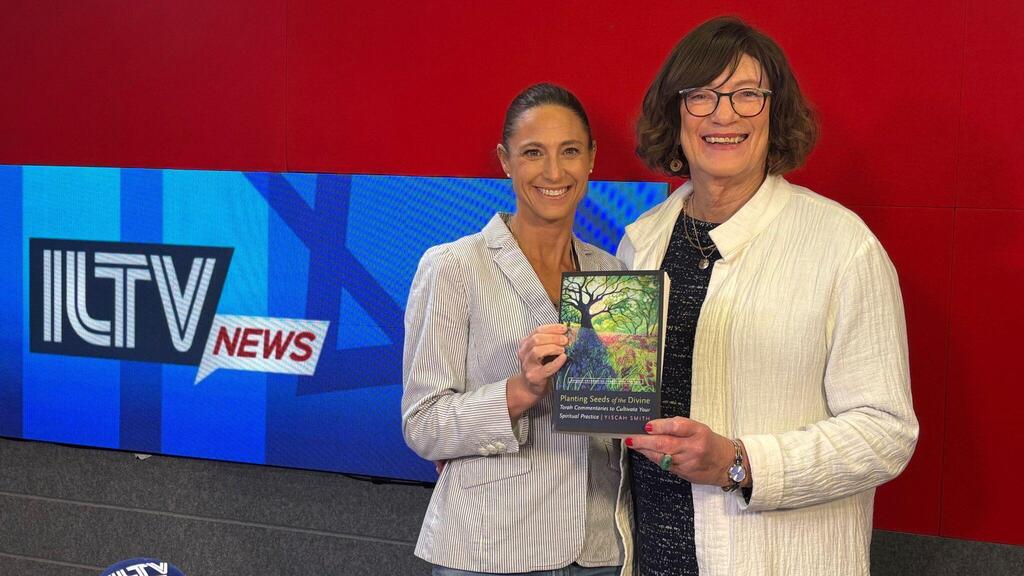There’s no one right way to love or connect with God, says Yiscah Smith, the Jerusalem educator and author of a new book called “Planting Seeds of the Divine.”
In a special Passover episode of the ILTV News Podcast—recorded during the Festival of Freedom—Smith shared insights from her book and reflected on how to stay spiritually grounded after 18 months of war.
PODCUST CUT
(ILTV )
Smith, who teaches at the Pardes Institute of Jewish Studies, focuses on helping others connect with their inner spirituality. When asked about the concept of freedom—especially during a holiday when 59 Israeli hostages remain in Gaza, including at least 24 believed to be alive—Smith emphasized the difference between physical and spiritual liberation.
“You hear some of the stories of the hostages as they've been released… what they did to stay human, to keep up hope, to keep up prayer,” she said. “So while they were physically in deplorable—we can't even imagine what kind of—conditions, their spirit was alive. We need to really pray for these people—and for each other—that we have physical freedom, but we also need to be spiritually free.”
1 View gallery


ILTV News Podcast host Maayan Hoffman (left) with Jerusalem educator Yiscah Smith
(Courtesy)
Many people equate freedom with physical mobility—choosing where to live or whom to marry. But Smith said true freedom is being “faithful to your inner being, which is our soul.” She invoked the example of former Soviet refusenik Natan Sharansky, who she loosely quoted as saying, “They never really enslaved me. They never had me. They never imprisoned me. They imprisoned my body but not my soul.”
Planting Seeds of the Divine explores 47 ways to connect with spiritual awareness, drawing from the weekly Torah portions. Smith said the book was inspired by a practice she began years ago in her Nahlaot neighborhood, where she tends a vibrant garden.
Watch previous episodes of the ILTV News Podcast:
Each month, she invites guests to experience an alternative kind of Shabbat gathering in the garden.
“It’s like an alternative prayer space,” she explained. “We chant, I share a teaching on the weekly Torah portion, we meditate together, we share. We have a potluck lunch. It’s a way of celebrating and honoring Shabbat in a less traditional way.”
Her guests, moved by the experience, encouraged her to turn it into a book. Planting Seeds of the Divine, now available for pre-order on Amazon, is the result.
Smith is a warm, soft-spoken grandmother who speaks intentionally and looks you in the eye. She’s non-judgmental and her message, she says, is for everyone—Jews of all denominations, and even non-Jews.
“I am cultivating spiritual sensitivity,” she said. “In Israel, one can be traditional, secular, or ultra-Orthodox—and all of these people can be spiritually sensitive. I teach a global type of messaging.”
Self-growth is also central to her teachings. One example from the book explores the middah (character trait) of self-forgiveness through the biblical story of Joseph and his brothers. After their father Jacob’s death, the brothers fabricate a story to win Joseph’s mercy. Instead of retaliating, Joseph cries.
Smith explained that, according to several commentaries, Joseph cried because he realized his brothers had not yet forgiven themselves.
“We talk about Yom Kippur—asking God for forgiveness, asking each other for forgiveness,” she said. “It’s wonderful not to hold onto hurt. But what about forgiving myself? That’s the middah I teach.”
“I talked about that for many years, that I didn’t forgive myself,” she added. “I know what it’s like, and I’ve learned how to cultivate becoming a more self-forgiving person.”
First published: 19:08, 04.16.25



